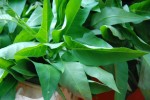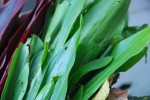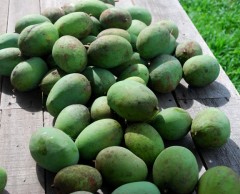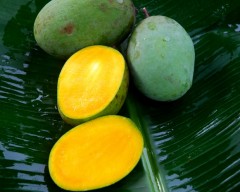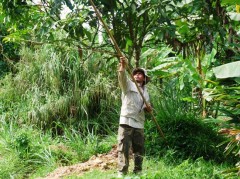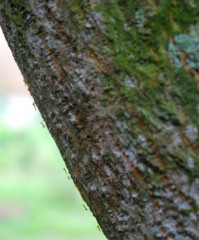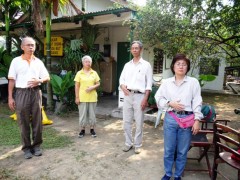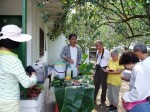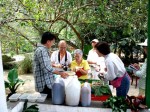Apr 15, 2013
Sights And Sounds Of The Farm - Emerald Doves
Emerald Doves are usually very flighty and nervous near humans due to poaching. At our farm, they are resident and are found in many nooks and corners. Many times they will just swagger off, in a pigeony way (which they are) when they see us. Here's one that's just in front of our workers' quarters. The video of it feeding in our garden captures the sounds of the farm at around 11 am, mid-morning. If we hadn't tell you, you would think the video is in the forest with the myriad sounds of birds and insects. But that's what we are trying to achieve in our farming - that we can be commercial and yet be in harmony with Nature.
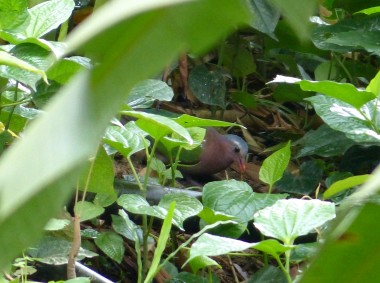
Here's a recording of the sounds that you will hear at our farm. You would be forgiven if you think you are in the jungle.
16:12 Posted in Blog, Permaculture, Sustainable Farming | Permalink | Comments (0) | Tags: emerald dove, nature farming, permaculture, sounds of tropical forest, punai tanah
May 14, 2012
Poultry Diseases - Natural Cures I
Leucocytozoon sp (chicken malaria) infection is common amongst poultry in a tropical humid country like Malaysia. Todate, worldwide, treatment is by drugs, in particular sulphamonomethoxine sodium, an antibiotic.
Indications are:
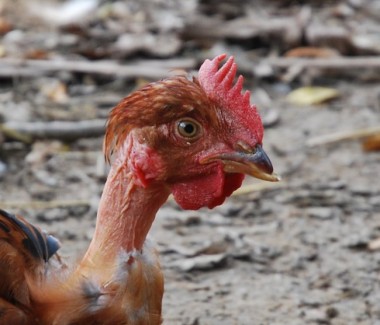
Beginnings of cyanosis - possible spleen damage
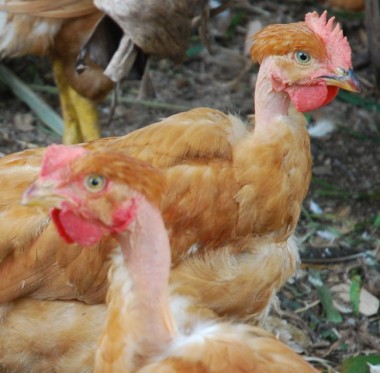
Normal faces
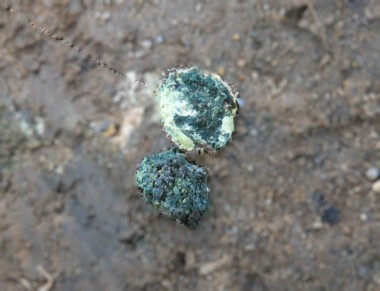
Greenish faeces - rule out Newcastle Disease first.
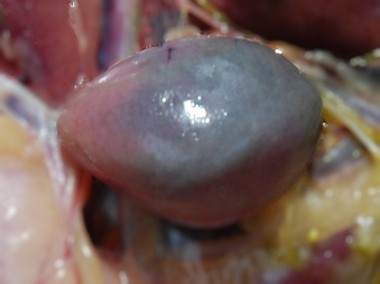
Inflamed and damaged spleen
Mortality varies. If untreated, mortality can reach 30%.
At our farm, we use herbal medication which is grown within the farm:
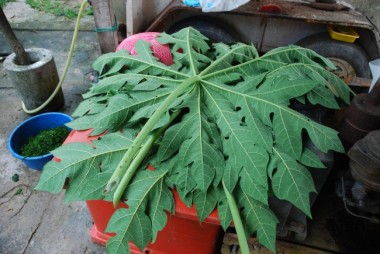
Papaya leaves, hempedu bumi (andrographis paniculata) and patawali (tinospora crispa, tinospora rumphii), pounded to extract a juice
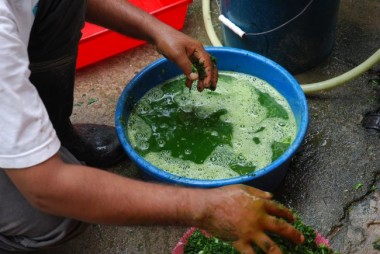
Ratio by volume is papaya leaf 70, hempedu bumi 20, patawali 10
10 liter herbal extract concentrate to be mixed with the drinking water for the day for 1000 chickens.
After 24 hours, the chickens will start to show some mild improvement.
After 48 hours, the faeces will begin to clear and the appetite will be about 70% back.
The juice can be withdrawn when the feed consumption returns to normal.
No drugs is necessary. This treatment is first published in this blog and is now OPEN SOURCE.
Leucocytozoon is spread by blood sucking insects. So, prevention is always possible and encouraged.
Surah 26: 7 – 8, Have they, then, never considered the earth how much of every noble kind (of life) We have caused to grow thereon? In this, behold, there is a message, even though most of them will not believe.
Mar 05, 2012
Flowering Enhancers - I
Some of the fruit trees shall be flowering soon. Time to make some flowering enhancers. Fermented flowering enhancers provide potassium and phosphorus, plus microbes to help the plants absorb the nutrients.
We use a large plastic container with a lid.
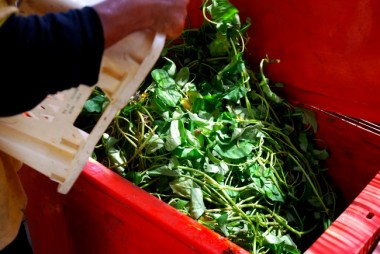
Add 10 kg of kangkung.
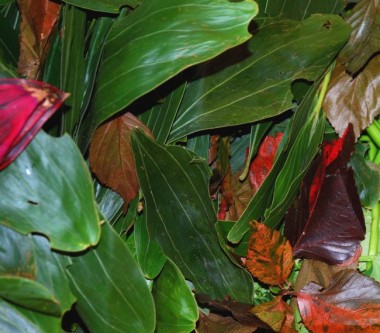
And 10 kg young acacia mangium leaves.
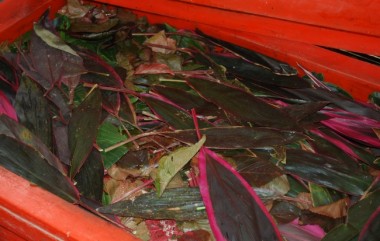
And 10 kg of red colored leaves.
Now add the potassium and phophorus:
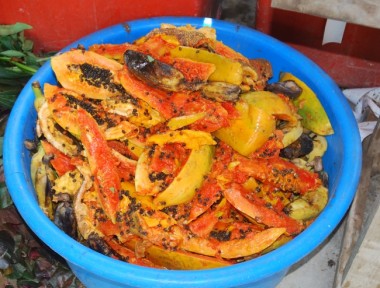
25 kg of papaya and 25 kg of bananas.
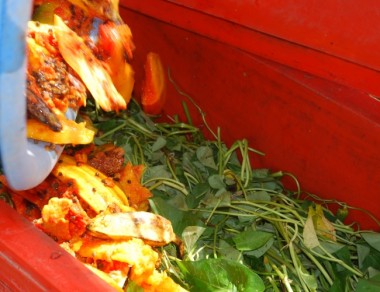
Put them together, leaves at the bottom.
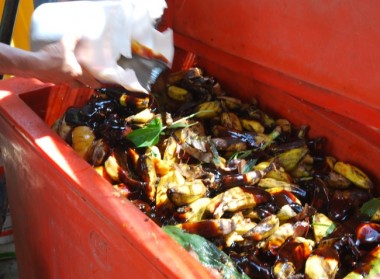
Add some molasses (agri grade, from Pertanian), about 20 kg will do.
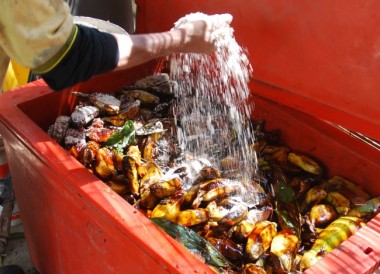
Sprinkle about 500gms quarry (granite) dust into the mix.
Cover with a plastic sheet, close the lid, and let ferment for 30 days.
(To be continued : Flowering Enhancers - II; How To Use)
14:03 Posted in Bio Nutrients, Sustainable Farming | Permalink | Comments (0) | Tags: bio nutrients, em, nature farming, sustainable farming
Aug 19, 2010
Natural Flowering Enhancers
We use what's in the farm to make our own flowering enhancers. Our dragon fruits never stop flowering and producing fruits. Our durians can be fruiting two to three weeks before others.
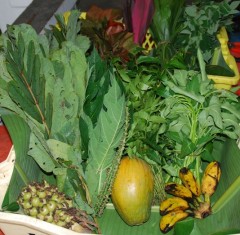


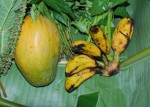
papaya 2.5
banana 2.5
Red Leaves 1.0
Kangkung young leaves 1.0
Acasia young leaves 1.0
Molasses 2.0
Quarry dust sprinkle
Put in a container until half full (or half empty, whichever). Leave for up to 60 days, covered loosely, before proceeding.
There are a few variations to use the above (which we shall call the Mother). One way is as follows:
Dilute adding 1 part filtered Mother, 1 part molasses to 20 parts water to make a Concentrate. Let the Concentrate sit for up to 7 days before diluting further required amount to use. Add one part Concentrate, one part molasses and 50 parts water for Spraying Dilution. It goes without saying you must always use unchlorinated water.
Do not spray direct from Concentrate on plants. They may wilt. Always spray diluted. Not recommended for ornamentals.
If you are using compost tea, add one part filtered Mother to 20 parts tea, and spray. Use only on fruit trees (including pitaya).
Email me direct if you encounter problems.
Notes:
1. You can find the acacia tree being grown along highways. You can use the young leaves from young trees. Acacia is an invasive, so don't plant it in your farm unless you have the patience to continually weed out the young trees.
2. Any red leaves will do.
17:45 Posted in Bio Nutrients | Permalink | Comments (6) | Tags: nature farming, organic farming, qi, qi farming, flowering enhancers, penggalak bunga
Jun 07, 2010
Nature Farming - Kuini
You don't find many kuini (mangifera odorata) in the market. Part of the reason is that the tree is not very productive as far as commercial farmers are concerned. For the same amount of fertiliser, pesticides and labour, the production is significantly less for the kuini tree as compared to other commercial hybrid mangoes.
Kuini trees in a row
Pak Din plucking the fruits
Another reason is that the weevils love kuini and losses can be high, unless one really go the 'overkill' path and spray pesticides copiously.
At DQ Farm we use nature to help us. And nature works 24/7 without rest.
Vicious red ants swarming entire trees from root to fruit, keeping the fruits free from weevils and other insects.
Red ants swarming a fallen fruit protecting it from insects:
buah macang buah kuini
masak sebiji dalam daun
mengapa begini hatiku ini
habis bulan berganti tahun
My translation:
the kuini the machang
fold one in leaves to ripen
this heart of mine, oh what's hidden
a year passes with each fading month
10:42 Posted in Nature Farming | Permalink | Comments (3) | Tags: nature farming, organic farming, kuini, mango farming, mangifera odorata
Jul 23, 2009
Nature Q-Farming And Durians
This year, the damage to the durians from fungus is less than 5%. A couple of years back, the damage was 30%. The supervisor at that time could not learn how to do the qi-compost right and we did not use the Teh Qi. His breathing was all wrong.
Ali, my current supervisor is a picture of amazement and just cannot understand what's happening.
He keeps on asking, how come the Teh Qi (Qi Tea) can do this? What is inside the Teh Qi that can reduce the fungal attacks by so much?
Ah Tick, the man who actually takes care of the durians for us on a daily basis says that the degree of damage is the same as those durian farms that use chemicals RIGHT UP TO THE LAST MINUTE OF HARVEST. He himself owns 8 acres of durians. He says, because of the low prices, farmers must ensure that every fruit survives, so they spray until the durian drops. So if you buy conventionally grown durians, make sure you wash your hands after opening the durians before taking hold of the pips to eat.
The Teh Qi is unique, it provides the full compendium of microbes that plants need PLUS it vibrates with energy that gives plants that little extra edge between infested with fungus or being disease free, ceteris paribus.
The next problem Ali and Ah Tick wants Nature Q-Farming to solve is the issue of uneven ripening, especially the D24 variety. This is a problem with unknown causes that farms from Thailand to Australia face. I told them, it's not a problem. Come next season, Nature Q-Farming will reduce that problem by 70%, I promised.
12:32 Posted in Nature Farming | Permalink | Comments (0) | Tags: qi gong, chi kung, nature farming, durians
Jun 22, 2009
Workshop on Nature Q-Farming
We had a workshop on making bio nutrients and basics of Nature Q Farming on June 20th 2009. The workshop is meant for home food growers and not for commercial farmers. The objectives are to 1) introduce market gardening to urban dwellers to reduce the hold of commercial farmers over our lives, 2) to empower urban dwellers to take back some of the responsibility of producing healthy food for our children, and 3) to allow urban dwellers to have a source of income to offset increasing costs of living in the cities.
Participants were 'aligned' to the energy in the environment and taught how to harness the energy that is present, to enhance the energy and to incorporate the energy into the plants and vegetables that they are growing. By so doing, they give to the plants a part of their energy and in return the plants and microbes will multiply it many fold for them.

The field of energy around us.
Read 'The Field' by Lynne McTaggart.
For the first time, these 'die-hard' organic gardeners felt a living connection with the plants that they have been growing for years. We become a part of the plants and they become a part of us, in this cycle of passing of nutrients and living energy between one living organism to another; we are no longer 'eating' a plant instead we are sharing and exchanging living energy.
I can still remember the wonder on the face of one of the participants when he felt the microbes releasing energy at him. And I remember also the remark of another participant that he was wondering why he did not start panting after a fairly vigorous walk to some wild bamboo groves and back, as he was a heart patient.
An important part of Nature Q Farming is working with the plants and herbs and microbes that is in the environment.
Making brews of various friendly microbes to be used as intermediaries between us and the plants that we are growing.
18:11 Posted in Bio Nutrients | Permalink | Comments (5) | Tags: nature farming, organic farming, qi, qi farming
Mar 15, 2009
Farm Visit March 15, 2009
Retailers and customers of DQ Chicken came to the farm today to see for themselves how the farm is managed, and the farming methods used.
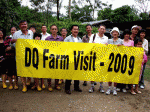
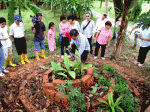
The herb spiral drew interest
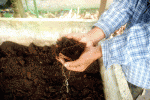

For the priviledge of visiting the farm, you have to smell this compost made of dung, carcasses and dried leaves and branches.
You also have to smell a still used chicken litter that has not been removed for 7 years, from one of the coops.
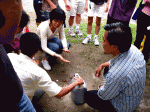
Feeling the Qi
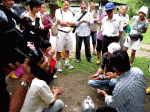
Looking for Qi
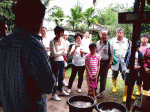
Qi Tea for spraying on plants
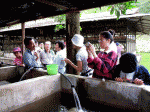
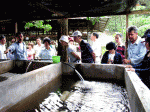
High productivity aquaculture - one tiny pond such as this can fetch a revenue of RM10,000 per cycle of 6 months.
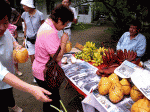
Then fruits from the farm for everybody.
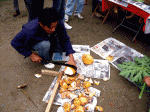
Coconuts to quench your thirst after a hot day walking around.
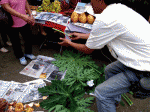
Here's a straw from a papaya leaf stem to drink your coconut water with.
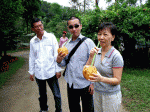
Yummy, perfect end to a hot day.
18:53 Posted in Visitors | Permalink | Comments (2) | Tags: sustainable farming, organic farming, farm visits, nature farming








